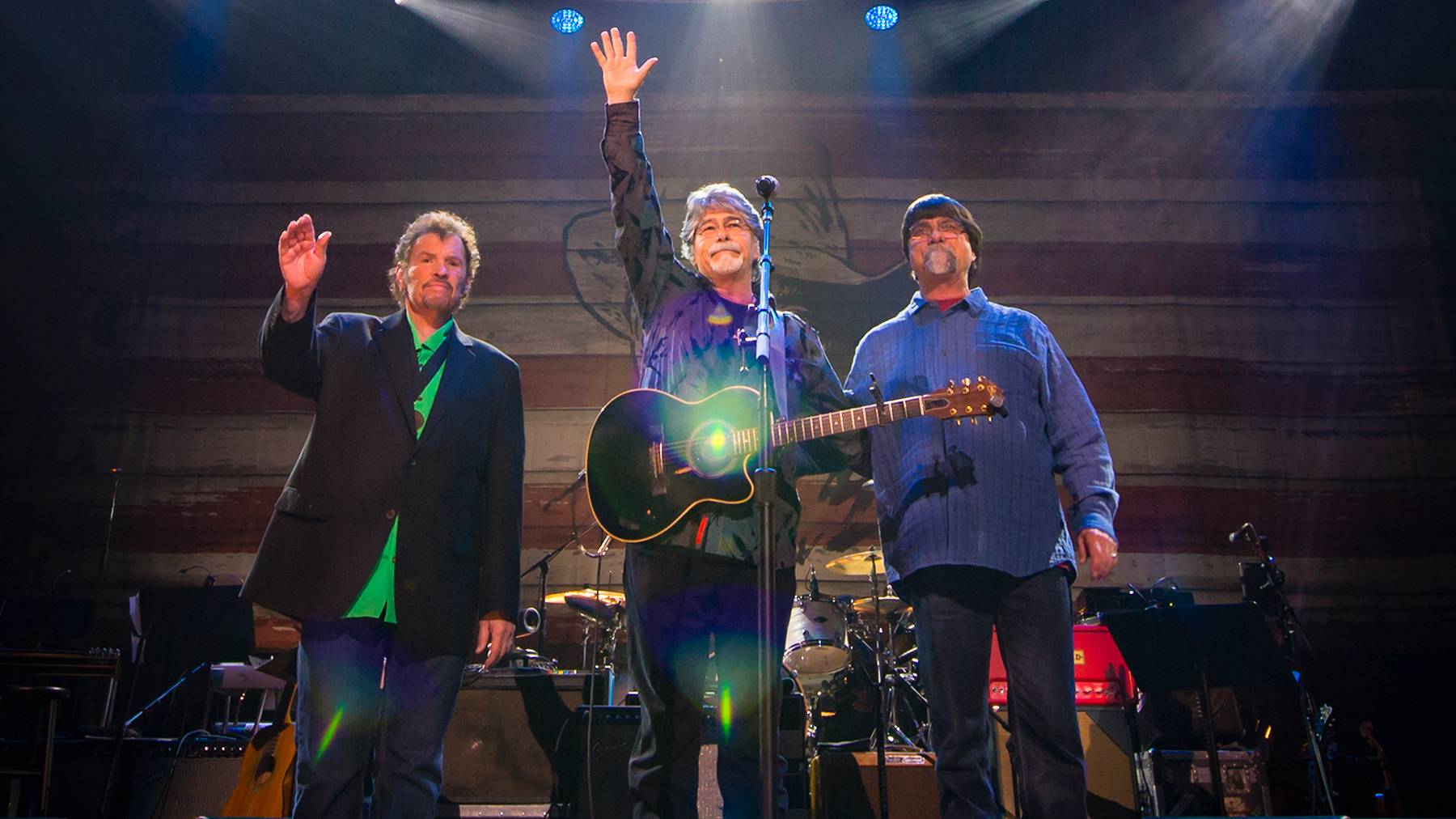Mac Wiseman Still Adding to His Legacy at Age 91

Mac Wiseman doesn't mind telling people, "I'm the last one left."
The genial 91-year-old member of the Country Music Hall of Fame looks across the living room/office/museum where he spends his days making business deals, writing songs, receiving his many worshipers in the country and bluegrass fields, singing and even recording.
The latest -- and he promises not the last -- of his recordings includes a pairing with Alison Krauss on his old signature song, "'Tis Sweet to Be Remembered," that is the denouement to the autobiographical album he wrote with noted Nashville guitarist and producer Thomm Jutz and (and journalist and performer) Peter Cooper.
That new Mountain Fever Records album, I Sang the Song, features "'Tis Sweet" as well as 10 new songs Wiseman, Jutz and Cooper wrote on nine Sunday afternoons here in the living room of his comfortable suburban dwelling in the almost-rural (though that's certainly changing quickly in the "It City" boom town of development) section of southeast Nashville.
"I call this Lower L.A.," says the one-time West Coast A&R man, with a smile. "It's Lower Antioch," where he spends his days surrounded by memorabilia of an amazing life.
"There's no one left who has a story like Mac's," says Cooper, who also serves as senior director, producer and writer at the Country Music Hall of Fame and Museum.
While Wiseman's hands are too arthritic (he is 91, remember?) to play the guitar these days, the journey to this spot in his life, as chronicled in the new record, is unique and music-driven.
"I'm the last one left of the original board of the Country Music Association," says Wiseman, who also was an original member of the International Bluegrass Music Association.
Other "last one lefts" include his time spent playing guitar with Lester Flatt and Earl Scruggs after they left Bill Monroe's Blue Grass Boys to strike out on their own.
"I was one of the original Foggy Mountain Boys," says Wiseman, whose tenure with that group was relatively short, and whose career actually began as an upright bass player for singer Molly O'Day. Those alliances all would fit in the "last man left" category.
The young Wiseman -- hobbled somewhat by the infantile paralysis (his right leg is 1½ inches shorter than his left) -- departed the music-filled home where he lived with his family (his father was a manganese miner) to attend school, including training at the Shenandoah Conservatory, when it was in Dayton, Virginia, before it moved to Winchester.
And he is among the last of the old-time country music deejays as well. He took his turn in the mid-1940s at the microphone for WSVA in Harrisonburg, Virginia.
"I was there on the radio doing everything," he says. "News, announcing, whatever needed to be done."
Of course, he also introduced music, either recorded or live in the studio. He credits his radio stint -- at $20 for a 70-hour week -- with improving his enunciation, in doing so polishing his singing skills.
He leans back and laughs before telling a story from his radio days.
"It was 1944-45, during the second World War. This old gentleman would write me letters of encouragement. But he said, 'You might think of someone else to do the news.'
"It was because I was just reading off the teletype machine. I didn't know how to pronounce those French and German towns" where the fighting was taking place.
He'll tell you happily that by comparing the cars of radio executives to those the visiting hillbilly musicians drove for guest spots at the station firmly convinced him he should be a performer.
That's all in the past -- something which the old storyteller mines for his newest record. The past also fueled the 2004 release (also produced by Cooper and Jutz) of Songs From My Mother's Hand.
That collection is a dozen songs Wiseman's mother wrote down, word by word and verse by verse, while listening to the radio up in the mining country.
"In wintertime, when it was too cold to do anything outside, my mother would sit by the radio. She couldn't work outside, but she was there crocheting, quilting and mending clothes," Wiseman says, noting that she always had a notebook nearby to capture song lyrics from the broadcasts. It took many listening sessions for her to get each word right, but winters are cold and cruel in Crimora, Kentucky.
"I've got 13 books of her very legible handwriting that she copied off the radio," he says. "She used those composition books that we used in school."
Jutz, Cooper and Wiseman have spoken of perhaps mining those notebooks for another album. Wiseman at least would like to do a book of them, perhaps also including his mother's recipes ("I've got her cookbook," he says, proudly). Or, always thinking of history, he might put those recipes somewhere in a book he hopes to compile that will detail his life by publishing some of the hundreds of photos -- from Crimora right through a fabulous career -- with photo captions providing the main text.
At 91, Wiseman isn't spending all of his time just reminiscing about life from a final curtain perspective. Rather he is a time-traveler, mentally going back to retrieve pieces of that life to preserve in music and in words.
And I Sang the Song is hardly the end of the line.
He has recorded three discs' worth of a collection he calls Slices of Life -- "I've got a slice of pumpkin pie on the cover," he says -- and two discs of Favorite Songs of Mom, Dad and Me that are ready for pressing.
And there's a movie being made of his life story, based on the 2015 book Mac Wiseman: All My Memories Fit to Print (As Told to Walt Trott).
The new album I Sang the Song also could be labeled an "as-told-to" venture since Cooper and Jutz took stories Wiseman told and turned them into folk songs.
But it actually is more of a three-man musical marriage, and all three appear in the credits as authors of the songs.
In fact the two younger men came up with the concept back when they were still finishing up the My Mother's Hand album.
The plan and the execution were essential to how it turned out, according to Wiseman.
"They came out to the house," he explains. "We'd get together each Sunday. I'd tell a story. And they'd try to rhyme it and put a tune to it.
"They put it down the way I told it, in the same vernacular."
Jutz and Cooper say they got the stories from reading the Trott book as well as from their frequent afternoons at Wiseman's house, a Mecca for anyone who loves American roots music.
"Peter and Thomm had done their research. They knew what stories they wanted to tell and they'd sit here and ask questions and we came up with the songs," says Wiseman.
"We'd write it all here," Cooper has said in another recent interview, as he looked around the large living room filled from floor to ceiling with photographs, posters and mementoes of Wiseman's nine-plus decades.
Actually this album features 10 songs fashioned from those sittings, with the finale being "'Tis Sweet to be Remembered,'" Wiseman's signature tune back when he was a troubadour, wanderlust taking him and his music to the masses.
Other than a few "intros" and "outros" between songs, this is the only song Wiseman actually performs on the album.
His companion on this tune is Alison Krauss, one of the many musicians who worship at the altar of Wiseman.
"I was so pleased," Wiseman says. "Alison heard about it and she said, 'Can I be on it?' That pleased me to death."
"I sang it in the key of G, the same key I sang in 1951 when I was working with Molly O'Day," he says.
The rest of the songs that were compiled in those nine writing sessions were recorded by other Wiseman worshipers, like now full-grown mandolin prodigy Sierra Hull, fiddle genius Andrea Zonn (who when not recording here in Nashville travels the world as a leader in the band that backs JamesTaylor), Shawn Camp and oft-sardonic singer-songwriter John Prine.
Prine sings the title tune on I Sang the Song, with Cooper providing harmony vocals.
"They all did this because they love Mac," says Cooper.
One of Wiseman's anecdotes tells just how seriously the artists took this effort.
"When Jim Lauderdale was recording 'Barefoot Till After the Frost,' he called me to ask me how I would say something. He wanted to do it just right," says Wiseman.
"Well, I'm very impressed with the talent we got to appear on it," says Wiseman. "They all know my kind of music. I thought they did a tremendous job of interpreting it."
The artists' only source-material was this batch melodies and lyrics created by Cooper, Jutz and Wiseman.
"This is actually my life story in song. I don't know if it has been done before by anyone," says Wiseman.
"I am very fortunate and thankful that I have a very good memory, going back to when I was 4 or 5 years old. But I can't remember what I had for breakfast."
He has no trouble revisiting events that were signposts of his musical trail through the decades.
"I remember those things in detail. I tried to paint a picture of them I told to Thomm and Peter.... It wasn't no trouble at all. I just sat here and rambled right in my easy chair and they came up with it."
He may well be the last one left. But he's still creating his legacy.





